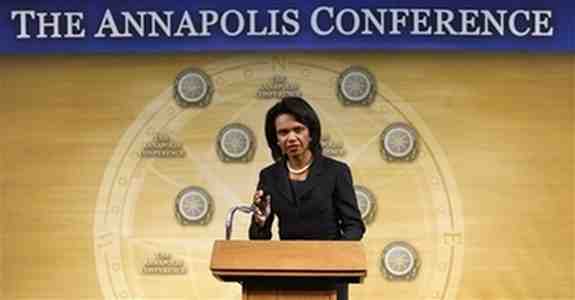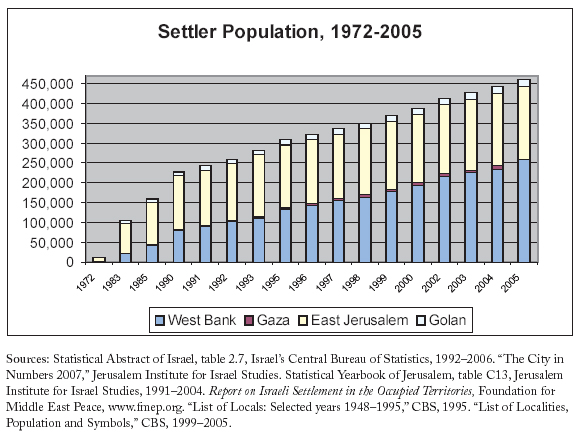In Annapolis, conflict by other means
By Robert Blecher and Mouin Rabbani, Middle East Report, November 26, 2007
Both Abbas and Hamas are betting, in opposite directions, on the Annapolis meeting and the process it may spawn. Abbas hopes to show that bilateral negotiations can achieve what resistance cannot, both in terms of diplomatic process and improvements in daily life. Hamas is wagering that precisely the opposite will occur, and that, once chastened, Fatah will have no choice but to revive its partnership with the Islamists, on the latter’s terms. Yet even should the international custodians of this process provide Abbas with sufficient goods to dissuade Fatah from resuming dialogue with Hamas, the Islamist movement assumes that the fruits of the process will ultimately redound to its benefit, as did those of the Oslo process when Hamas in 2006 won control of the legislature. And should the process further threaten Hamas’ position, it need not stand idly by. Abbas is in no position to conclude a historic compromise without the safety net of a national consensus including Hamas — much less implement one in the teeth of active and perhaps armed Islamist opposition.
Compelling Hamas to fight for its very survival rather than what it perceives as its rightful role in the Palestinian political system is only compounding these challenges. The Gaza Strip is under unprecedented pressure. Border crossings remain closed to most exports and all but the most vital imports, precipitating an economic freefall from which an eventual recovery will be prolonged and difficult. The economy is being hollowed out, as the private sector — the most productive — is progressively destroyed. Given the continued rocket fire on southern Israel, the Olmert government has declared Gaza a “hostile entity,” setting the stage for further measures including embargoes on electricity and fuel. These sanctions may be a prelude to an eventual Israeli military offensive in the Gaza Strip akin to that in the West Bank in 2002, though many consider this scenario unlikely — except in the event of significant Israeli causalities — because it will create as many Israeli dilemmas as it resolves. Once Israel conquers the coastal strip, it will either need to remain and occupy or withdraw and, inevitably, face further attacks. That Hamas will be unseated from within seems even less likely; despite growing popular disenchantment and sporadic clashes, the Islamists have the wherewithal to remain in power and a proven determination to use it. [complete article]
See also, Hamas: Abbas has no right to give up one inch of Palestine (Haaretz) and 4 main issues that divide Israel, Palestinians (McClatchy).
Iran: The uninvited guest a peace summit
By Kaveh L Afrasiabi, Asia Times, November 27, 2007
According to a Tehran University political science professor, the reason Tehran is highly skeptical about the results of the Annapolis conference is that “all the principal participants are weak. You have a lame-duck president in the White House who completely forgot the Palestinian issue for seven years, a weak Israeli prime minister [Ehud Olmert] and an even weaker Palestinian leader [President Mahmoud Abbas], who does not lead more than a minority of Palestinians. How is a durable breakthrough possible under these conditions when the principal participants are not powerful enough to make the necessary concessions? Can Olmert stop the illegal settlements or order their removal from the Palestinian lands? The answer is no.”
Such sentiments can be found aplenty in Iran, prompting President Mahmud Ahmadinejad to echo the sentiment of Hamas leaders, who are highly critical of those Arab leaders participating at Annapolis, by stating: “Attending the conference shows a lack of political intelligence. The name of those who give concessions to the Zionist occupiers by attending will not be remembered for goodness.”
Iran’s Foreign Minister Manouchehr Mottaki, on the other hand, has stated, “The end result of all these conferences leads to a further erosion of Palestinian rights.” Mottaki has been touring the Gulf Cooperation Council states and has been delighted that Sultan Qabus of Oman in particular has praised the latest International Atomic Energy Agency (IAEA) report on Iran’s nuclear program as “successful” and has supported Iran’s nuclear rights. [complete article]
Did Livni mean what she said?
By Jawad Boulous, Haaretz, November 26, 2007
One morning recently, I went to a grocery store in the north Jerusalem neighborhood of Beit Hanina, where I bought a few items, which I paid for with a Jordanian coin. When I glanced at the change I received, in Israeli currency, I saw I had been shortchanged by three shekels. I looked at the grocer, who, without my saying a word, seemed to understand, as he shouted angrily: We still remember you as tramps. Now you all drive around in Mercedes, but you still squabble with us over a few pennies.
That was the opinion of a simple Palestinian about his Palestinian brothers who live inside Israel – if you will, the “Israeli Arabs” or “the Arabs of ’48.” Of course this was just one man’s opinion, but there is little doubt that it is representative of a widespread feeling among our Palestinian brethren, who expresses an objective reality.
I recalled the episode when I heard Foreign Minister Tzipi Livni declare last week that the Palestinian state would provide a national solution for all the Palestinians, including those who live inside Israel. The minister in effect was offering her understanding of the real significance of Israel’s insistence on conditioning its participation in the Annapolis conference on Palestinian recognition of Israel as the state of the Jewish people. The connection Livni made between the Palestinian refugees and the Palestinian citizens of the State of Israel – by saying that both of them could find their solution in a future Palestinian state – did not leave much to the imagination, for this time the remarks were made by the foreign minister and in the name of the Israeli government, and herein lies the danger.
Since the state’s establishment, its leaders have refused to internalize the fact that an Arab Palestinian minority remained here. Their decision to stay and live on their lands constituted a painful reminder to the leaders of the Zionist movement about the way in which reality failed to conform to Israel Zangwill’s well-known slogan that saw this as “a land without a people for a people without a land.” [complete article]
An arrest on the border
By John Gravois, The Chronicle of Higher Education, November 23, 2007
Ghazi-Walid Falah was not worried when Israeli security agents stopped his car on a narrow mountain road near the Lebanese border, just before sundown on July 8, 2006.
When they discover who I am, he assured himself, they will immediately release me.
Mr. Falah is a prominent political geographer who studies borders. He is a tenured professor at the University of Akron. And he is a dual citizen of Israel and Canada. He thought he had nothing to fear.
But his self-assurance — and his freedom — were short-lived.
That night agents of the Israel Security Agency, also known as the Shin Bet, or Shabak, arrested Mr. Falah and took him to a police station in Nahariya. There they told him they had found something in his camera: a photograph of a “sensitive” military antenna near the coast.
Then they used the word meragel: Spy.
In the middle of the night, a three-car convoy carried Mr. Falah, bound hand and foot, to his brother’s home, near Nazareth, so the Shin Bet could search his luggage there. In that blur of a visit, Mr. Falah spoke just a few words to his brother. “Contact my lawyer,” he said. “I’m clean.”
That was the last Mr. Falah’s family, friends, or colleagues would hear from him for the next 18 days. A gag order from an Israeli court forbade Mr. Falah to speak with his lawyer, his lawyer to speak with the press, and the Israeli press to cover his arrest.
Four days into Mr. Falah’s detention, war broke out between Israel and Hezbollah in Lebanon, further burying his disappearance in the public consciousness. When he was released, on July 30, with the war still raging, he had been imprisoned and interrogated for 23 days. No charges were ever filed against him.
In the history of the region’s conflicts, the story of one detained geography professor is a minor episode at best.
But at a time when scholars of the Middle East agonize over visa denials and public tenure battles, Mr. Falah’s experience gives even starker definition to the risks involved in studying the region. [complete article]


